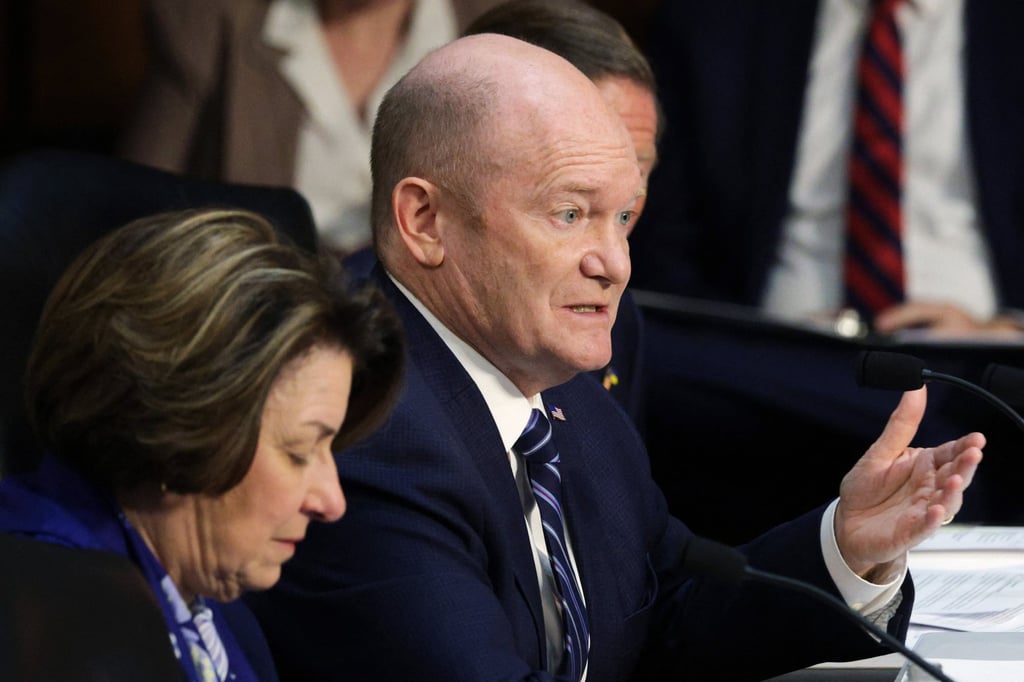China is systematically exploiting US weaknesses and inconsistencies to expand its reach in the Taiwan Strait and South China Sea, but it also faces its own energy, diplomatic and economic vulnerabilities that Washington needs to better exploit, witnesses testified before Congress on Tuesday.
The hearing before the Senate Foreign Relations Subcommittee on East Asia, the Pacific, and International Cybersecurity Policy saw unusual bipartisan unanimity in a deeply divided Washington on the need to better support East Asian allies and partners.
“We need to be much more strategic,” said Craig Singleton, senior fellow with the non-partisan Foundation for Defence of Democracies. “It doesn’t mean regime change. It doesn’t mean we’re going to take actions that undermine the livelihood of the Chinese people. But there are very clear things we can do to push back.”
China is exposed politically, diplomatically, in the information space, with trade finance and economics, he added.
“Beijing interprets vulnerabilities, not only in Taiwan’s defences, but also in US and allied responses, as validation of its approach to date – sustained coercion below the threshold of war,” added Singleton, a former US diplomat.
Witnesses testified that Beijing has effectively employed a stealth grey zone strategy over decades to wear down its neighbours, grab territory when opportunities arise – as seen in nearly 90 per cent of the South China Sea that China now claims – and keep provocations below levels that would elicit a US military response.
“Ultimately, Communist China would rather act as a python, solely squeezing countries that resist, rather than acting as a cobra and striking quickly,” said committee chairman Pete Ricketts, a Republican from Nebraska.
Chris Coons, a senator from Delaware and the senior Democrat on the subcommittee, said the former Joe Biden administration employed many effective tools to counter China that have since been degraded under President Donald Trump’s administration. This drew little pushback from Republican members.
These include strong support for US allies and partners, rather than slapping wholesale tariffs on them; supporting the Voice of America rather than defunding it to counter Chinese propaganda efforts; cutting USAID and other development budgets; and withholding scheduled weapons sales, cancelling dialogues and denying presidential visits for Taiwan.
The self-governing island’s energy situation makes it particularly vulnerable to a Chinese embargo, analysts said, with reserves of some 10 days of liquefied natural gas and 42 days of coal.
Beijing sees Taiwan as part of China to be reunited by force if necessary. Most countries, including the US, do not recognise Taiwan as an independent state, but Washington is opposed to any attempt to take the self-governed island by force and is committed to supplying it with weapons.
“If we continue to dole out concessions to China and look the other way as they change facts on the ground, we may well lose the fight of this century,” Coons said, adding that a primary challenge is to deter the Chinese President from launching an attack on Taiwan. “How do we make Xi Jinping’s morning ritual, ‘not today, not this week, not this month’?”

Witnesses said the US has enormous resources, alliances and clout. But its infighting, impatience, policy turnarounds and outdated structure undercut its effectiveness. “China’s grey-zone success exploits gaps in our national security bureaucracy designed as it was against historical conventional threats,” said Raymond Powell, executive director of the SeaLight Foundation, a California-based civic group. “Our window to act is not just closing, it’s vanishing.”
The Chinese embassy in Washington did not immediately respond to a request for comment.
To effectively counter China’s decades-long patient and consistent strategy, Washington should take several steps, witnesses said. These include pushing back more effectively with civil-military sanctions, trade tactics and information to counter Chinese narratives.
It can also help Taiwan build up its energy resiliency with strategic reserves and hardened oil terminals, pipelines and refineries; reassure and better support allies and partners, particularly Japan, Australia, Taiwan and the Philippines, with a more muscular presence and better contingency planning.
“How do we make the whole greater than the sum of the parts?” said Ely Ratner, principal with the Marathon Initiative civic group.
“Whether we like it or not, today, we are not prepared to fight as a collective with our allies and partners,” the former Defence Department official said. “We do not have the command and control we need. We do not have the plans we need. We do not have the force posture we need.”
Other effective US strategies to counter China, witnesses said, included forging an all-of-society strategy; becoming more active and less reactive; and learning from Manila’s effective “assertive transparency” approach that publicises aggressive Chinese grey zone confrontations in real-time.
“The systematic exposure, documentation and release of information about grey-zone tactics pulls back the curtain on China’s opacity and deniability,” said Powell, a former military intelligence official. “In short, I think we should light up the grey zone.”

